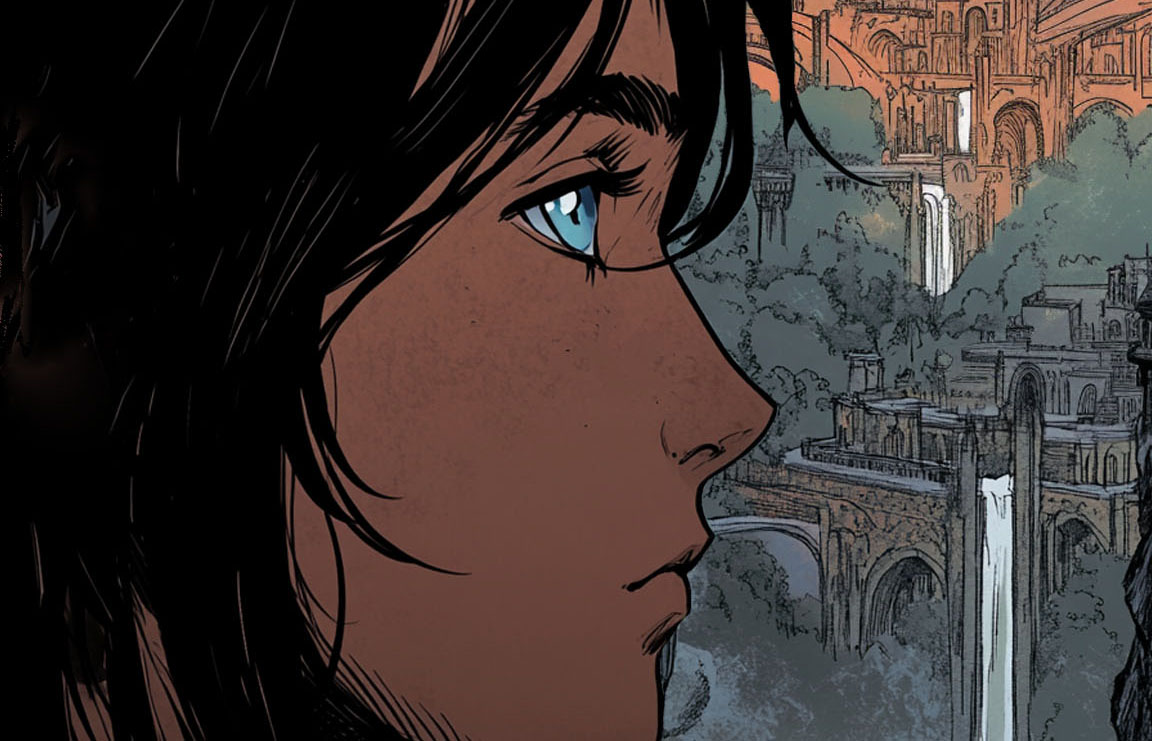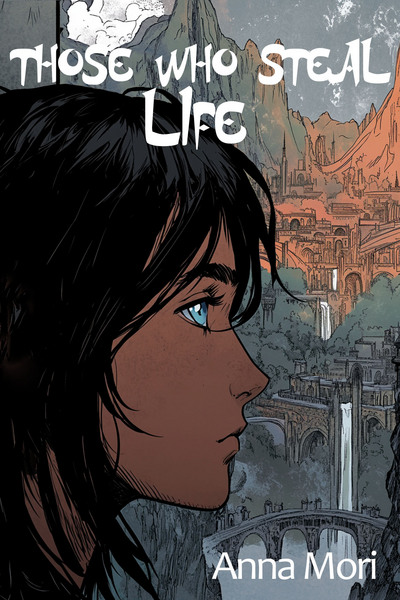Lyn
The moment the door slammed shut behind him, the man — Batur was his name — rounded on him.
“Damn it, Lyn! We already know they tried to arrest you. Could you, for once, not turn everything into a damn spectacle?”
“A spectacle, I’ll have you know, that was excellent,” Lyn retorted, wounded. “The crowd loved it — applause, gasps, rapt attention… and, of course, a thrilling chase to close the show.”
“You think this is funny? The more noise you make, the greater the risk for all of us. I’ve said it before — those lewd moments in your stories are going to be the death of us. I still don’t get why you can’t do without them.”
“Because the moment you start ranting about politics or religion, people either walk away wisely or drop dead from boredom. No one wants to listen to yet another raving fanatic. If you want an audience, you talk about sex.”
From the back of the room, a woman — Melissa — lifted her head from where she sat at the table with several other people.
“He’s right, Batur, and you know it.” Her voice was calm but firm. “A thousand people have heard Lyn’s stories, and out of them, a handful will start thinking. And more importantly — when the Blind Bakhshi disappears from the city, quotes from his scandalous writings will still be whispered as passwords among those who refuse to bow to the new regime.”
“Exactly. Sadly, we can’t just put up posters saying, ‘If you need help, come here,’” Lyn spread his hands in mock despair. “It’s a double-edged sword, I’ll give you that, but people need a way to find us.”
“And they need to find us before it’s too late,” Melissa added. “A few coins in the right hands, a few words in the right ears — that’s how you save people. Not by causing an uproar when they’re already standing on the scaffold.”
She turned back to the others, speaking softly to reassure them. A small group of people huddled together — fugitives, at risk under the rule of the Arabiya. By dawn, Lyn’s network had to smuggle them out of Bukhara.
Lyn had always meant to give the Organization a proper name. At first, everything he came up with sounded unbearably pretentious. Then, there simply wasn’t time.
“I don’t get why we’re sneaking around and dragging this out when we could just gather people and drive the Arabiya out of the city,” a boy of about fourteen burst out, fire in his voice. “Everyone hates them anyway!”
Batur gave him a long, dark look. “I used to think the same when I was your age — that justice and righteousness were things you could carve out of another man’s belly with a sword.”
“No bombs, Aydar,” Lyn informed the boy. “Not even if you really, really want to.”
Aydar flushed — whether from embarrassment or frustration was anyone’s guess — but gave a curt nod. Lyn had met him when word reached the Organization about a wild plan to blow up a government records building—the very one where the Arabiya kept files on the men they’d arrested in Bukhara. Aydar’s father had been one of them.
The kid was sharp. He’d managed to cook up something resembling Hellenic fire — that legendary explosive powder from Bizanth, the formula of which was a closely guarded secret. His version wasn’t as potent; more smoke than flame, but in some situations, that was even better. Lyn had used it himself earlier that day to slip away from the censors.
As for Aydar’s father… they hadn’t been able to help him. And by now, there was little hope they ever would. No one had seen the man since the Arabiya took him.
Lyn made his way to the small kitchen of the safehouse. A pot of some half-congealed stew sat abandoned on the table — the others had clearly already eaten. With a sigh, he helped himself to a quick, solitary meal.
Lyn sketched out ideas for his next piece as he ate. Sure, he already had enough written to recycle his old work in the next city — perform, sell, whatever — but he just liked coming up with new stories. Just like back in Bizanth, when he made up that whole legend for himself, Justin, and Narseh.
But now he wanted more. Something sharper. Something that wouldn’t just have an anti-religious bite but would actually hold up as a damn good story on its own.
It’d be great to show his work to Narseh, get his take on it. But asking outright? Not a chance. Narseh wasn’t exactly a book guy — especially when it came to fiction. And then there were the erotic scenes. Lyn had a feeling Narseh would find them… questionable.
How did he know? Well, let’s just say that, a long time ago, he’d once tried slapping Narseh’s ass during sex. Turns out, the whole dominance thing had very clear boundaries with Narseh, and those boundaries were wherever he personally didn’t like something.
Like — come on. Spanking? That’s normal, right? Like, universally normal? Apparently not. Narseh hadn’t just disapproved — at first, he didn’t even understand what Lyn was trying to do. And then he launched into a whole lecture about how he’d seen this in people’s minds before but never grasped the idea, how it was horrifying to bring elements of physical punishment into lovemaking, punishment meant to subjugate a child, not just hitting them in a fit of anger (which would be terrible enough), but deliberately putting them in a humiliating position and—
Well. He phrased it in such a way that Lyn actually felt like a depraved piece of shit. And here he’d thought that Narseh’s perfect ass and his soft, gentle eyes were just made for that kind of thing.
Lyn wouldn’t have minded getting spanked himself. Or even properly whipped, if they were going all out. But the moment he brought it up, Narseh started handling him like some fragile orphan — gentle to the point of condescension, like Lyn had suffered some unspeakable trauma. Why was biting okay? Why was getting pinned down fine? But hitting — just for fun, just for the rush — was verboten? Maybe Lyn was a little fucked in the head, but so what?
And honestly, who was Narseh to judge? The man played the perfect obedient servant, basked in praise, practically purred when petted. If that wasn’t a weird kink, Lyn didn’t know what was. But he let that one slide.
…Anyway. It wasn’t just the sex scenes he wanted Narseh’s opinion on. He wanted to know what he thought of the work as a whole. Maybe not the literary merits — Narseh wouldn’t care about that — but at least the point Lyn was trying to make.
He glanced at the group of soon-to-be refugees, huddled around Melissa at the table. “Anyone hungry?” he asked.
Immediate headshakes. Some of them even eyed him like he was about to bite. Not that he looked particularly threatening — these poor souls were just scared of their own shadows.
Melissa had a way with people like that. She always had. Before all this, she’d been a prostitute in one of Ilithyia’s brothels — like so many of Lyn’s comrades. No surprise there; when the alternative was getting raped for pennies every night, joining a cause like his was an easy choice. What was surprising was how many of them turned out to be clever, educated, even brilliant.
Okay, no. Lyn had always known that. Just like he’d known that Ilithyia deliberately kept its workers too overworked, too traumatized, too drunk to even think about escape, let alone pull it off. He’d given them that chance. He’d freed the ones who’d been enslaved.
(…Right after putting every single one of them on a strict no-alcohol diet for a few months. He’d learned that lesson the hard way.)
He got why so many of them drank. War veterans weren’t the only ones carrying that kind of damage — except, unlike soldiers, prostitutes never killed anyone. Their consciences were clean.
Some of them had left the Organization. But many had stayed. And some, he knew, had never truly climbed out of the pit, no matter how much freedom or money they’d been given.
But plenty had.
Lyn did a headcount. Five refugees.
There should’ve been six.
“Where’s Apama?” he asked. “She was supposed to be here by now.”
A heavy silence fell.
“Our people went to get her,” Melissa said. “It’s been two hours.”
Lyn tensed. “That’s bad.”
“If they were caught…”
“…they might lead the authorities straight to us,” Melissa finished grimly.
Apama had been scheduled for trial and execution on charges of blasphemy — for performing abortions. Oh, and witchcraft. Just for good measure.
Not that abortions were all she did. She had real medical skills — healing the sick, treating injuries. She’d helped the poor, the guards, even the children of the very censors who’d put her on trial. But abortion? That was the one thing people needed most right now. The Caliph’s armies, supposedly immortal, were running low on soldiers, after all.
A woman. A scholar. A doctor. She was everything the new rulers of Bukhara hated most.
Evening was closing in. Lyn had gone over the plans with his comrades, packed his things to leave the city that night with the refugees—whether with Apama or without—but mostly, he just paced the room, restless.
He exchanged a few more messages with Narseh. Narseh wrote about yet another round of startling changes in Eranshahr, about how he’d be having dinner with Gelareh, Kiyanoush, Kaveh, and Laleh… It was slightly comforting to know that at least there, in Aryan, the world was the way it was supposed to be, and no one was in danger. Slightly.
Lyn fired back a couple of teasing messages, though his heart wasn’t in it. More often than not, when he wrote to Narseh about sex, what he actually wanted to say was something like: Today was another shitty day, another person we couldn’t save, and all I want is to rest my head on your lap and die like that. But you don’t send messages like that. Narseh wouldn’t want to read that kind of thing.
Besides, maybe things weren’t that bad. Not yet.
“I’m going after them,” Lyn finally snapped, once darkness had fully settled over the city.
“Are you out of your damn mind?!” Batur grabbed his shoulder. “Last thing we need is you getting yourself caught too!”
At that moment, there was a knock — five measured taps, their signal. Aydar rushed to open the door, and several figures stepped inside. In the middle of the group, cloaked in a dark shawl, stood Apama.
One of her escorts pushed back his hood, and Lyn recognized Ardashir.
“Something happen?” Lyn asked.
Apama hesitated, then spoke.
“Forgive me. I’m the one who delayed your people. I… couldn’t make up my mind.”
Lyn frowned.
“What do you mean? You know the Arabiya won’t spare you.”
“Oh, that much is obvious. But you have to understand me too, boy… This is my city. I was born here. My family’s here, my neighbors… At first, I told your people, thank you for getting me out, but where the hell am I supposed to go? I could just hide somewhere, keep my head down…”
“For how long? A week? A month? They’ll find you and arrest you again. Probably because one of those dear family members or neighbors turns you in.”
“Well, a week is still a week! And a whole month — think about it…” She exhaled sharply. “Every midwife who ever helped women in Bukhara either fled, got stoned to death, or is rotting in a cell. You think a month is nothing, but that’s dozens of lives. If I leave, there’ll be no one left. Not even a sliver of hope.”
Silence settled over the room.
“But—” Lyn started.
“I know, I know…” Apama waved him off. “Your friend—” she nodded toward Ardashir, “already gave me the whole speech. Every single argument you’re about to make. We fought about it for hours… And, well, he convinced me. Says it’s better to live. Says I’ll do more good if I keep treating people in places where, for now, that’s not a crime. Maybe he’s right… But that doesn’t make it any easier.”
Lyn felt like absolute shit too. He’d been through this scene a hundred times, had these same conversations day after day, but he never got used to them.
“Well, since you’ve decided, let’s not waste time,” he said flatly. “We leave tonight.”
Apama hesitated, then asked, almost pleadingly, “Would it be possible to at least take my books from home? And my tools, medicines, pouches of herbs? I even have a little money stashed away…”
“No. It’s too risky to go back there now,” Melissa said, trying to reassure her. “But there’s another part of our organization in Marakand. They’ll help you settle in… or get somewhere else, if you want. Because in a few years, Marakand will probably fall to the Arabiya too, and it won’t be safe there either…”
“Don’t worry, you won’t be left without a means to live,” Lyn added.
The Organization’s money mostly came from Ilithyia’s businesses. Would his adoptive mother have imagined that those funds would end up saving hundreds of outcasts — people condemned simply for knowing things, for wanting to heal and educate, to uncover the secrets of nature and magic in an attempt to make life better, while the new rulers did everything in their power to drown the people in ignorance? Yeah, of course she would’ve. And even though her noble ideals hadn’t always matched her actions, she definitely would’ve approved of how the money was being spent.












Comments (0)
See all